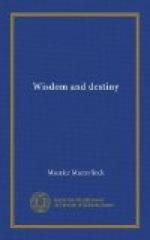these are all moral joys built up, and these are profounder
far than intellectual or physical joys. Translate
into words the feeling that spurs on the hero, and
how trivial it seems! Insignificant too does the
idea of duty appear that Cato the younger had formed,
when compared with the enormous disturbance it caused
in a mighty empire, or the terrible death it brought
on. And yet, was not Cato’s idea far greater
than the disturbance, or death, that ensued?
Do we not feel, even now, that Cato was right?
And was not his life rendered truly and nobly happy,
thanks to this very idea, that the reason of man will
not even consider, so unreasonable does it appear?
All that ennobles our life, all that we respect in
ourselves, the mainsprings of our virtue, the limits
that feeling will even impose upon vices or crimes—all
these appear veriest trifles when viewed by the cold
eye of reason; and yet do they fashion the laws that
govern every man’s life. Would life be
endurable if we did not obey many truths that our
reason rejects? The wretchedest even obeys one
of these; and the more truths there are that he yields
to, the less wretched does he become. The assassin
will tell you, “I murder, it is true, but at
least do not steal.” And he who has stolen
steals, but does not betray; and he who betrays would
at least not betray his brother. And thus does
each one cling for refuge to his last fragment of
spiritual beauty. No man can have fallen so low
but he still has a retreat in his soul, where he ever
shall find a few drops of pure water, and be girt
up anew with the strength that he needs to go on with
his life. For here again reason is helpless, unable
to comfort; she must halt on the threshold of the
thief’s last asylum, even as she must halt on
the threshold of Job’s resignation, of the love
of Marcus Aurelius, of the sacrifice made by Antigone.
She halts, is bewildered, she does not approve; and
yet knows full well that to rise in revolt were only
to combat the light whereof she is shadow; for amidst
all this she is but as one who stands with the sun
full upon him. His shadow is there at his feet;
as he moves, it will follow; as he rises or stoops,
its outline will alter; but this shadow is all he
commands, that he masters, possesses, of the dazzling
light that enfolds him. And so has reason her
being, too, beneath a superior light, and the shadow
cannot affect the calm, unvarying splendour.
Far distant as Marcus Aurelius may be from the traitor,
it is still from the selfsame well that they both draw
the holy water that freshens their soul; and this
well is not to be found in the intellect. For,
strangely enough, it is not in our reason that moral
life has its being; and he who would let reason govern
his life would be the most wretched of men. There
is not a virtue, a beautiful thought, or a generous
deed, but has most of its roots hidden far away from
that which can be understood or explained. Well
might man be proud could he trace every virtue, and
joy, and his whole inward life, to the one thing he
truly possesses, the one thing on which he can depend—in
a word, to his reason. But do what he will, the
smallest event that arrives will quickly convince
him that reason is wholly unable to offer him shelter;
for in truth we are beings quite other than merely
reasonable creatures.




